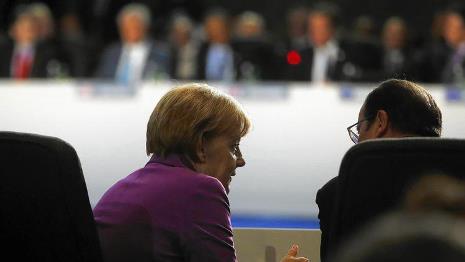NATO grapples with how hard to push back against Putin over Ukraine

For years, NATO has focused on missions in distant places, such as Afghanistan and Libya, and admitted only one former Warsaw Pact member, Albania, in the last decade.
As military spending by NATO members fell 20% during the last five years, some Western leaders wondered whether the alliance had a future at all.
But as the North Atlantic Treaty Organization`s summit in Wales last week made clear, Western leaders see the Russian moves in Ukraine as a direct threat to NATO members individually and to the postwar order generally.
The 28 members are in the midst of an internal struggle over how strongly to push back against Russia. Some argue against what they see as overreactions that would risk military confrontation. Yet it is clear that defense against possible Russian moves is again a top priority and that NATO will carry out at least a limited buildup of forces along an East-West divide that is hundreds of miles closer to Moscow than it was in the Cold War era.
"Putin`s actions in Ukraine have reinvigorated NATO in a way that would have been unimaginable only a few years ago," said Michael McFaul, former U.S. ambassador to Russia and former advisor to President Obama. "The alliance was struggling to find a new role and talking about things to do beyond Europe.
lRelated As NATO talks near, Merkel appears to be losing patience with Putin
EUROPE
As NATO talks near, Merkel appears to be losing patience with Putin
SEE ALL RELATED
8
"Now, because of him, they`re focused on their original purpose," said McFaul, now at Stanford University. "This is a self-fulfilled prophecy."
NATO didn`t agree to supply arms to Ukraine at this summit, as some members wanted, nor to throw out its 1997 agreement with Moscow that pledges not to permanently base troops near Russia`s borders.
But NATO skirted the edge of the no-bases pledge by agreeing to a "continuous" military presence along Russia`s frontiers. It recommitted to its core pledge to defend each member, as expressed by Obama`s promise that the United States would be willing to go to war with Russia to protect tiny Latvia, Lithuania and Estonia. NATO approved formation of a 4,000-troop vanguard force that could move within hours to Russia`s border, as well as upgrading military exercises and deployments.
Obama also has urged NATO to begin a long-term effort to rebuild Ukraine`s army and to consider adding new members to the alliance.
Putin has long resented what he sees as the West`s post-Cold War alliances with Eastern European countries and has believed that restoring Russian control over former Soviet territories could return the country to greatness.
In the West, passionate debate has raged over whether NATO`s post Cold War expansion was wise or provocative. To Putin, however, the issue seems clear: He saw the expansion as a threat to Russia and seized an opportunity to play on Western "encroachment" to build political support at home.
In February, when Ukraine`s pro-Russia government collapsed, Putin decided he could not allow the new government to be economically aligned with the West.
"He decided to show once and for all he would push back on Western expansion," said James Goldgeier, dean of American University`s School of International Service and a former Europe advisor in the Clinton White House. "He saw it all as humiliation."
But Putin has undermined his own cause, many experts say, by playing up the East-West conflict in a way that has strengthened the resolve of many Western countries. He has made statements that strengthened the arguments of NATO members who have been pushing the alliance to stand up to the Kremlin.
Putin told Jose Manuel Barroso, president of the European Commission, that Russian troops could take over Ukraine in two weeks. In a speech, he declared that Russia`s enormous nuclear capability was a "reality," and said that Kazakhstan "never had any statehood," a chilling reminder of a claim he once made to former President George W. Bush that Ukraine was not a "real country."
John Herbst, a former U.S. ambassador to Ukraine who now is with the Atlantic Council, said the Russian leader`s bravado was a blunder. Putin wanted to show his contempt for his Western adversaries, he said, but "just by mouthing off, he`s hastening the process of NATO taking a stronger position on Russia."
McFaul, the former ambassador to Russia, said that though some NATO members continue to resist confrontational moves, the West will steadily advance to a tougher line.
NATO members now feel pressure to increase their military spending, he said, adding that he believes NATO will eventually open permanent bases near Russia`s border and will strengthen ties to Ukraine and Georgia, though those countries will not become alliance members anytime soon.
McFaul said worries about Russia will freeze Western plans to further reduce the nuclear arsenal. Though there was "momentum" in 2009 within the Obama administration for scaling back on nuclear weapons in Europe, "that`s over now."
Russia will respond by building up its own forces on the border, McFaul predicted. That could lead to risky confrontations — between patrolling warplanes, for instance — as happened during the Cold War, he said.
At the same time, the two sides have been moving apart economically amid Western sanctions that are tipping the Russian economy into recession.
In hindsight, McFaul said, the summit and discussions of recent days "will be seen as a historic pivot, back to NATO`s original main concerns."















































